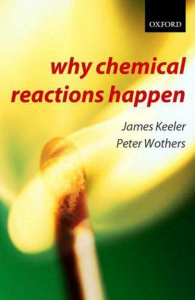Why Chemical Reactions Happen
 By James Keeler and Peter Wothers
By James Keeler and Peter Wothers
Review by Rachel (Chemistry)
After a couple of university open days where everyone was told to “read around the subject”, I was really struggling to find a book which built on what I knew from AS levels. Some books I looked at (only the front cover of) were so thick and difficult looking. I wanted one I could understand – and fit in my bag!
For those who get bored by textbooks, feat not! Here the author tries to whet your appetite with certain mysteries which will be explained throughout the course of the book. Like a murder mystery, by the end of the book all is revealed!
The book starts with some questions about certain reactions. Why do some oppositely charged ions form a precipitate but others do not? I quickly, as the author assumes, justified it with a vague answer about energy being given out. Yet precipitates also form when energy is taken in!
As you read through, there is a great introduction to many areas of Chemistry which are really interesting but aren’t even touched on at school. How does some abstract quantum theory about orbitals actually have relevance? Concrete examples of really useful reactions are given which wouldn’t happen if this theory wasn’t true.
Reading the book will also help with A2 Chemistry though – I found it actually explained a couple of mechanisms at A2 better than my A Level textbook. Plus in my interview we had some spare time at the end and the tutors asked me about areas of Chemistry I found interesting so I mentioned a couple of the mechanisms in the book.
I would definitely recommend this book as it is interesting to get to the bottom of the mysteries, helped with A2 Chemistry and gave me some material for my Oxford interview.
Review by Harry (Chemistry)
Science had always really appealed to me, but I had very little idea which course I wanted to do until Year 12.
Our chemistry teacher used to set us problems after lessons to keep us “thinking chemically”. One puzzle I found particularly interesting was that of whether a closed room would get warmer or cooler if you left a fridge open inside. To find the solution he pointed me in the direction of Why Chemical Reactions Happen by Peter Wothers and James Keller. The book covers a wide range of topics, all presented in a logical and easily understandable manner. Usually these are accompanied by diagrams. Even better, rather than only providing mathematical proofs, the explanations are related to real world situations – just like the fridge problem.
The refrigerator question is quite simple, as to power the fridge you must add energy into the room so the temperature must increase. Unless the fridge were 100% effective at cooling, in which case the temperature would remain the same.
The book is structured around what a university Chemistry course might entail, with a range of topics being covered, most containing a couple questions of this style. I would recommend it to anyone thinking of taking a science degree – but, given that it is written from an enjoyably introductory perspective, also to those who enjoyed science at GCSE. It certainly convinced me that Chemistry was the course I wanted to take further. If you do decide to have a look, I hope you’ll enjoy it as much as I did.
Review by Ruth (Chemistry)
This book is a must read for any prospective Chemistry student or anyone thinking of studying Chemistry. It was actually recommended to me by a current Chemistry student at the Oxford Open Day.
This whole idea of this book is captured in the title Why Chemical Reactions Happen, which was a question that I had never thought about before I picked up this book. We all know ice freezes to water at 0℃ but why does it happen and why at that temperature? The answer to this question requires consideration of entropy, enthalpy and even thermodynamics! This what I loved about this book: it strips back the layers of even the simplest reactions to find out what actually makes the reaction ‘go’. You won’t believe how many factors are involved in even the simplest processes.
The authors do a brilliant job in breaking down difficult concepts into simple and familiar ideas, normally from the A Level course, then slowly building it back up so you understand not just the concept in question but also where it comes from. They illustrate this really clearly with diagrams when possible and even relate concepts back to principles discussed earlier in the book, so you can see how it all links together. I also found it worked in really well with my A Level Chemistry as it showed me where the concepts that I was learning about were actually coming from, which I found really interesting.
Being honest at some points this book can get quite complicated and I had to re-read several chapters until I began to grasp the topic in question. This is because this book deals with several key concepts from the first year of a Chemistry degree at Oxford. But this gives you a great understanding of what you’ll actually be studying if you choose this course and you can decide if it’s for you or not.
In summary if you’re at all considering studying Chemistry I cannot recommend this book highly enough. It’s a genuinely enjoyable read and will definitely help you decide whether or not Chemistry is for you.
Why Chemical Reactions Happen by James Keeler and Peter Wothers
ISBN-10: 0199249733
ISBN-13: 9780199249732
Try checking the availability of this book at your school or local library or explore second hand bookshops and websites. You may also wish to purchase from either Amazon or Blackwell’s.
